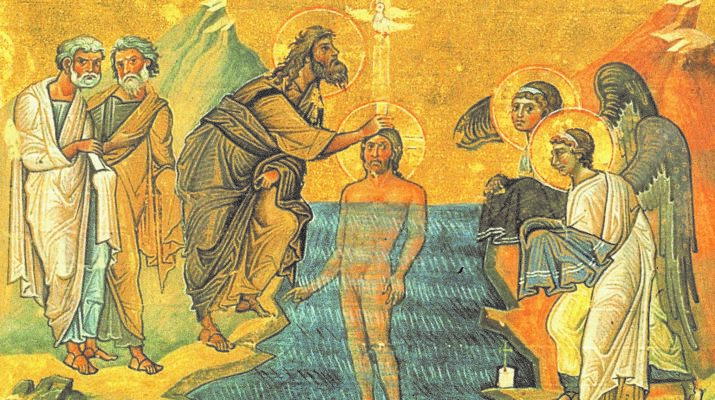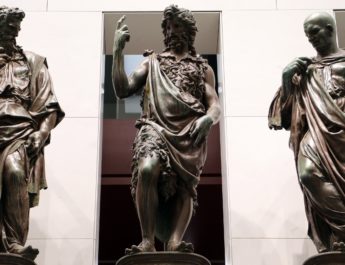Matthew 3:13-17
Baptism of the Lord A7
13 Then JesusA came from GalileeB to JohnC at the Jordan,D to be baptizedE by him. 14 John would have preventedF him, saying, “I need to be baptized by you, and do you come to me?”
A “Jesus” = iesous. From Hebrew Yehoshua (Joshua, the Lord is salvation); from YHVH (proper name of the God of Israel; the self-existent and eternal one); from havah (to become) or from hayah (to come to pass, become, be) + yasha (to deliver, defend, help, preserve, rescue; properly, to be open, wide or free, which implies being safe. So, in a causative sense, this is to free someone. This is Jesus or Joshua in Greek – the Lord saves or the Lord is salvation.
B “Galilee” = galilaia. From Hebrew galil (cylinder, rod, circuit, district); from galal (to roll, roll away, remove, trust, wallow). This is Galilee the region as well as the sea.
C “John” = ioannes. From Hebrew yochanan (Johanan); from Yehochanan (“the Lord has been gracious”); from YHVH (proper name of the God of Israel); from havah (to become); from hayah (to be, exist, happen) + chanan (beseech, show favor, be gracious; properly, to bend in kindness to someone with less status). This is John.
D “Jordan” = iordanes. 15x in NT. From Hebrew Yarden (Jordan River); from yarad (to go or come down; figuratively to fall; can also be used causatively to mean bring down). This is the Jordan, largest river in Palestine.
E “baptized” = baptizo. To dip, dye – covering something entirely with liquid. This is to submerge, baptize or wash.
F “prevented” = diakoluo. 1x in NT. From dia (through, across, successfully, because of) + koluo (to prevent, forbid, restrain; preventing either verbally or through action) [probably from the same as iolazo (to curtail, punish; used for punishing slaves); from kolos (docked)]. This is to forbid, stubbornly prevent, or utterly prohibit.
15 But Jesus answered him, “Let it beG so now; for it is properH for us in this way to fulfillI all righteousness.”J Then he consented.K
G “let it be” = aphiemi. From apo (from, away from) + hiemi (to send). This is to send away, release, let go, permit, or forgive.
H “proper” = prepo. 7x in NT. This is proper, fitting, or suitable. It is something that stands out as being very clearly the proper thing.
I “fulfill” = pleroo. From pleres (to be full, complete, abounding in, occupied with). This is to fill, make full or complete. Properly, this is filling something up to the maximum extent that it can be filled – an appropriate amount for its individual capacity. So, this is used figuratively for furnish, influence, satisfy, finish, preach, perfect, and fulfill.
J “righteousness” = diakiosune. From diakios (correct, righteous – implies innocent; this is that which conforms to God’s notion of justice, uprightness); From dike (the principle of justice; that which is right in a way that is very clear; a decision or the execution of that decision; originally, this word was for custom or usage; evolved to include the process of law, judicial hearing, execution of sentence, penalty, and even vengeance; more commonly, it refers to what is right); may be from deiknumi (to show, point out, exhibit; figurative for teach, demonstrate, make known). This is judicial or divine approval of character or action. This is righteousness, justice, justness, divine righteousness.
K “consented” = aphiemi. Same as “let it be” in v15.
16 And when Jesus had been baptized, just asL he came upM from the water, suddenlyN the heavensO were opened to him and he saw the SpiritP of GodQ descendingR like a doveS and alighting on him.
17 And a voice from heaven said, “This is my Son, the Beloved,T with whom I am well pleased.”U
L “just as” = eutheos. From euthus (straight as compared to crooked; upright, immediately). This is at one, soon, or shortly.
M “came up” = anabaino. From ana (up, again, back, anew) + the same as basis (pace, by implication the foot); from baino (to walk, to go). This is to go up in a literal or figurative sense.
N “suddenly” = idou. From eido (to be away, see, know, remember, appreciate). This is see! Lo! Behold! Look! Used to express surprise and or draw attention to the statement.
O “heavens” = ouranos. May be related to oros (mountain, hill) with the notion of height. This is the air, the sky, the atmosphere, and heaven. It is the sky that is visible and the spiritual heaven where God dwells. Heaven implies happiness, power, and eternity.
P “Spirit” = pneuma. From pneo (to blow, breath, breathe hard). This is wind, breath, or ghost. A breeze or a blast or air, a breath. Figuratively used for a spirit, the human soul or part of us that is rational. It is also used supernaturally for angels, demons, God, and the Holy Spirit. This is where pneumonia comes from.
Q “God” = theos. From Proto-Indo-European origins, meaning do, put, place. This is God or a god in general.
R “descending” = katabaino. Related to “came up” in v16. From kata (down, against, according to) + the same as basis (see note M above). This is to god down or descend in a literal or figurative sense.
S “dove” = peristera. 10x in NT – 5x of doves as part of Temple sacrifice, 4x of Jesus’s baptism, and 1x to be wise as serpents and innocent as doves. Of uncertain origin. Can refer to doves or pigeons.
T “Beloved” = agapetos. From agape (love, goodwill, benevolence; divine love as what God prefers); from agapao (to wish well to, take pleasure in, long for; to love morally or socially, to prefer). This is Beloved, loved, or very dear. It is used as a title for Jesus and as a thing that Christians call one another. Properly, this means divinely loved – a firsthand experience of God’s love.
U “am well pleased” = eudokeo. From eu (god, well done, rightly) + dokeo (to think, have an opinion, what seems to be; this is a personal opinion or estimate) [from dokos (opinion). This is to think well of someone or something, to think something is good, to approve or find pleasing/acceptable.]
Image credit: “The Baptism” from the Menologion of Basil II, late 10th or early 11th century.




